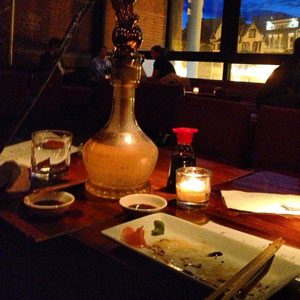
DEARBORN — Loose state laws may often put cities in a debacle when it comes to enforcing policies at a local level.
That is why the city of Dearborn took steps this week to reach out to state legislators in an attempt to correct a couple of ongoing trends with local residents and business owners that have become a growing nuisance for city officials.
At a Mayor’s briefing session on Tuesday, July 15, city officials met with the lobbying firm Governmental Consultant Services Inc. (GCSI) to address issues at the state level that included residents driving around with dealer license plates and business owners who are operating hookah lounges illegally, due to loopholes in the state’s tobacco laws.
In May, The Arab American News broke the story about a growing trend of dealers selling cars from their homes and switching out dealer plates from vehicle to vehicle in order to avoid paying high insurance costs.
While the law states that a dealer must obtain a business property to conduct sales of more than five vehicles per year, Mayor Jack O’Reilly said the city has discovered that many of the dealers have been setting up “dummy” business properties in Detroit to make it seem legitimate on paper.
Many of the business lots are simply used as storage space to park vehicles and are not used to sell cars. In many cases, the vehicles are taken into Dearborn’s neighborhoods and sold from dealers’ homes.
The Dearborn Police Department has also been having a difficult time cracking down on residents driving around with dealer plates. According to the Secretary of State, dealer-owned vehicles can be driven by employees, agents and family members for any use, except as a service vehicle.
Many dealers have gotten wind of this loophole and are allowing their family and friends to drive around with vehicles bearing dealer plates which are eventually going to be sold. A tactic commonly practiced involves a driver “car hopping” from one dealer vehicle to the next once it is sold.
An influx of cars being navigated around town with dealer plates has become increasingly present. Dearborn Police say they are ticketing individuals with dealer plates who don’t have proof of paperwork.
“We think people are getting their licenses under false pretenses because we know they’ve identified a business location where no business is being conducted,” O’Reilly said. “They are just trying to avoid insurance, especially if they have high risk drivers in their household.”
O’Reilly added that the poorly drafted law by the Secretary of State is in turn causing the state to lose revenue. The city believes the practice will only grow in coming years through word-of-mouth if the state does not update the law soon.
 |
The second concern the city addressed regards hookah lounges operating inside a restaurant setting, despite a state-wide law that says tobacco cannot be accessible in the same facility where food and beverages are being served.
When the state began enforcing the law in 2011, it put a damper on many local hookah lounges, which either had to stop selling food or stop selling hookah in order to comply with the laws.
Following the tobacco enforcement, many businesses owners remodeled their locations to allocate separate sections, with a separate entrance to accommodate a hookah setting inside of their restaurants.
However, in recent years, a loophole has allowed business owners to tiptoe around the law. Claiming that hookah is classified as “herbs” instead of “tobacco,” many businesses have now resumed operating with both food and hookah under one roof.
The city says it brought the issue forward to the Wayne County Health Department, but doesn’t have enough funds or manpower to enforce the law or test hookah products to see if they classify as tobacco.
The city would like the law to be broader to in order for it to translate to anything that is consumed through burning in a public place is illegal.
O’Reilly said it’s unfair for business owners who are abiding the law to have to compete with the ones who are blatantly breaking the law and getting away with it.
“The people who have done it right and have obtained their licenses are the ones who are at a disadvantage,” he said. “They are operating and complying with the rules and then their competitors are going in and competing with them even though they don’t have a license and haven’t paid for anything. People who do it right— have a license and isolate food and beverages from the hookah— should be rewarded and protected. The ones who are violating it should be penalized.”
An estimated 300 licensed hookah lounges exist across the state, 15 of which are in Dearborn. O’Reilly said there are far more than 15 hookah lounges in the city, many of which operate without a hookah license.
This summer, the city has also conflicted with the state’s firework usage laws. Several residents received misdemeanor citations despite the state’s enforcement of a civil infraction.
GCSI’s mission is to lobby for the needs of its client at a state level by reaching out to legislatures and forming coalitions. Barb Farrah, the lobbyist present at the meeting on behalf of the firm, will begin to take the first steps to bring Dearborn’s issues to the forefront in the upcoming months.






Leave a Reply